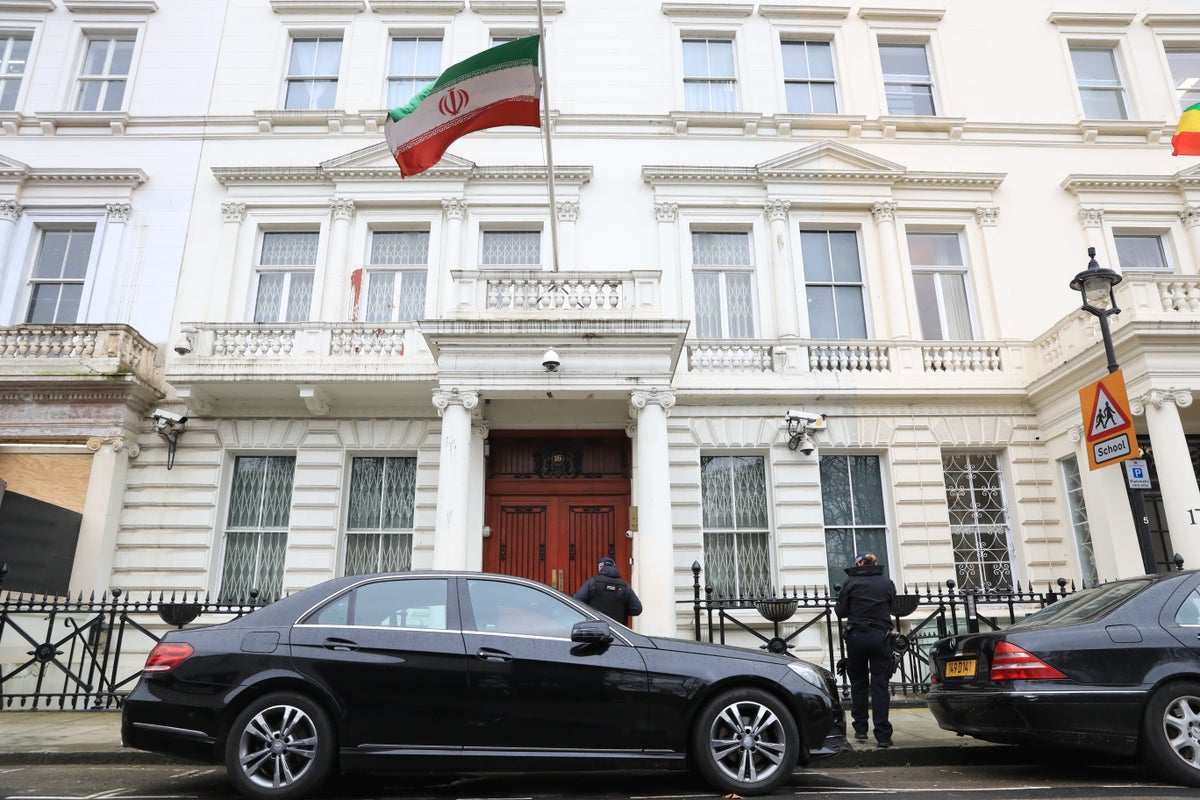
Britain and other European states that signed the Iran nuclear deal have taken a tough stance with Tehran by continuing with sanctions which were due to be lifted next month, and adding new punitive measures.
Germany, France and Rishi Sunak’s government say they are taking action in response to Iran’s failure to comply with International Atomic Energy Agency requirements, stockpiling uranium and breaking terms of the nuclear agreement.
A UK Foreign Office spokesman said: “Iran continues to breach its commitments under the JCPOA and advance its nuclear programme beyond all credible civilian justification. Alongside our French and German partners, we have taken a legitimate and proportionate step in response to Iran’s actions.
“The UK and our partners remain committed to a diplomatic solution but Iran must now take clear steps towards de-escalation. We are committed to preventing Iran from developing nuclear weapons.”
The move is likely to lead to a strong backlash from Iran which has accused the West of showing bad faith in negotiations over the nuclear deal.
Among the other signatories of the JCPOA ( Joint Comprehensive Plan of Action) the US has, so far, not made its position public on the removal of sanctions. Russia and China issued a statement in March stressing that the agreement, currently suspended, should be fully restored.
In a letter to Josep Borrell, the EU’s foreign affairs chief, James Cleverley; French foreign minister Catherine Colonna, and German foreign minister, Annalena Baerbock, will say the three countries will maintain nuclear sanctions and arms embargos under their own laws, and also add some UN sanctions on Iranian individuals.
Mr Borrell said in a statement: “The foreign ministers state that Iran is in non-compliance since 2019 and consider that this has not been resolved through the JCPOA dispute resolution mechanism. They express their intention not to take the steps regarding the lifting of further sanctions on JCPOA transition day on 18 October 2023.”
October was meant to be a crucial month in the JCPOA timeline with the implementation of ‘sunset clauses’ lifting sanctions.
The UN was due to lift restrictions on Iran’s research and development of nuclear capable missiles: lift a ban on the import and export of missile technology and long-range drones and the EUwas due to lift remaining sanctions on Iran’s nuclear programme. The US was also due to lift sanctions on individuals and organisations linked to Iran’s nuclear programme and seek Congressional approval for lifting broad economic sanctions.
Iran, in return, was due to ratify additional protocols with the IAEA ( International Atomic Energy Authority) giving inspectors greater access to nuclear facilities and providing more information.
Last month Mr Borrell presented a compromise proposal for a return to the JCPOA. Its main focus, he suggested, would be on lifting of major sanctions, and Iran to stop and undo what it had done on uranium enrichment and other nuclear activities since Donald Trump withdrew the US from the agreement.
Iran’s official news agency, IRNA, subsequently said that senior Tehran officials indicated that the proposals may be acceptable. There needed to assurances that a future US administration will not withdraw from the new deal and reimpose sanctions as Mr Trump had done.
The ‘Trump factor’ has become increasingly important with the likelihood that the former President will win the Republican nomination with the possibility that he may yet get back to the White House by beating Joe Biden.
An Iranian official told The Independent “ We would be foolish to ignore this. I do not see how a new agreement can take place without a guarantee that one of the countries taking part will not withdraw again. We need to consider that Trump will get pressure from the Israelis and he can sabotage the agreement again. What happens then? We wait until he goes, and then start all this again?”
Separate to the JCPOA the Iranian government, in an unofficial agreement with the US, had said it would not take its enriched uranium above 60% and would release five US citizens held in Iran. In return, the US would release $6bn of Iranian assets held in South Korea, via Qatar, as well as five Iranian prisoners held in the US.
Five American prisoners have already been released from Evin jail, in Tehran, and being held in less restrictive conditions. One of them is Morad Tahbaz, a British-American environmentalist who was arrested in 2018. When Foreign Secretary Liz Truss negotiated the release of two British Iranians, Nazanin Zaghari-Ratcliffe and Anoosheh Ashoori but Mr Tahbaz was left behind







